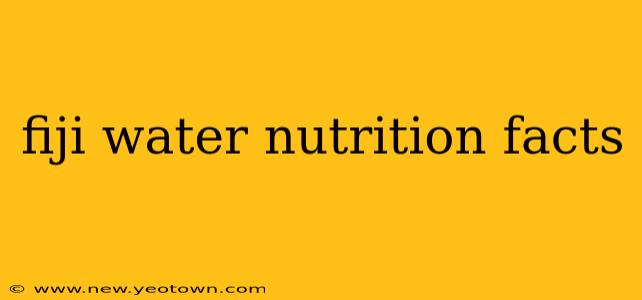Fiji Water, renowned for its pristine source and unique taste, has captivated consumers worldwide. But beyond the alluring marketing, what exactly are the nutrition facts of this popular bottled water? Let's delve into the details, addressing common questions and misconceptions. The truth is, Fiji Water's nutritional profile is remarkably simple, yet understanding its composition and potential health benefits requires a closer look.
The most striking aspect of Fiji Water's nutrition facts is its simplicity. It's essentially pure water, meaning it's calorie-free, fat-free, cholesterol-free, and sodium-free. This makes it a refreshing and guilt-free beverage choice for anyone seeking hydration. But what about those trace minerals? Let's explore that further.
What Minerals Are in Fiji Water?
Fiji Water naturally contains small amounts of minerals, primarily sourced from the volcanic aquifer where it originates. These minerals contribute to its slightly different taste compared to other bottled waters. While the exact mineral composition can vary slightly, you'll typically find traces of:
- Calcium: Essential for strong bones and teeth.
- Magnesium: Important for muscle function and nerve transmission.
- Sodium: While naturally occurring in low amounts, this is still a consideration for individuals on low-sodium diets.
- Potassium: Plays a role in maintaining fluid balance and nerve function.
- Bicarbonate: Acts as a natural buffer, helping to maintain the water's pH.
It's crucial to understand that the mineral content is minimal; Fiji Water is still overwhelmingly pure water. These trace minerals do not significantly alter the nutritional value, but they do contribute to its distinctive taste profile and potential slight health benefits, as discussed below.
Is Fiji Water Good for You?
The health benefits of Fiji Water are primarily linked to its hydration properties. Adequate hydration is essential for numerous bodily functions, including regulating body temperature, transporting nutrients, and eliminating waste products. The fact that it's low in sodium is also a positive attribute for individuals managing their sodium intake.
The trace minerals present in Fiji Water might offer some additional, albeit minimal, nutritional value. However, it's important not to overstate these benefits. Fiji Water isn't a significant source of any particular vitamin or mineral. Its primary health benefit is its contribution to daily hydration.
Does Fiji Water Have Electrolytes?
Yes, Fiji Water does contain electrolytes, although in very small amounts. Electrolytes are essential minerals like sodium, potassium, and magnesium that help regulate fluid balance and muscle function. However, the electrolyte content is so low that it won't significantly impact electrolyte replenishment after intense physical activity. For substantial electrolyte replenishment, dedicated sports drinks are a much better option.
Is Fiji Water Alkaline?
Fiji Water's pH level is slightly alkaline, typically ranging from 7.3 to 7.7. While some claim that alkaline water offers health benefits, scientific evidence supporting these claims is limited. The slightly alkaline nature of Fiji Water is simply a result of its natural mineral composition, and it shouldn't be viewed as a primary health benefit.
Conclusion: Fiji Water - A Refreshing Choice
Fiji Water's nutrition facts are straightforward: it's essentially pure water with trace minerals. Its primary health benefit comes from its ability to hydrate. While the slightly alkaline pH and trace minerals might offer minor additional benefits, it's not a miracle drink or a significant source of nutrients. However, as a refreshing and clean-tasting water, it serves its purpose well—offering pure hydration in a convenient package. Ultimately, the choice of whether or not to drink Fiji Water comes down to personal preference and budget.

